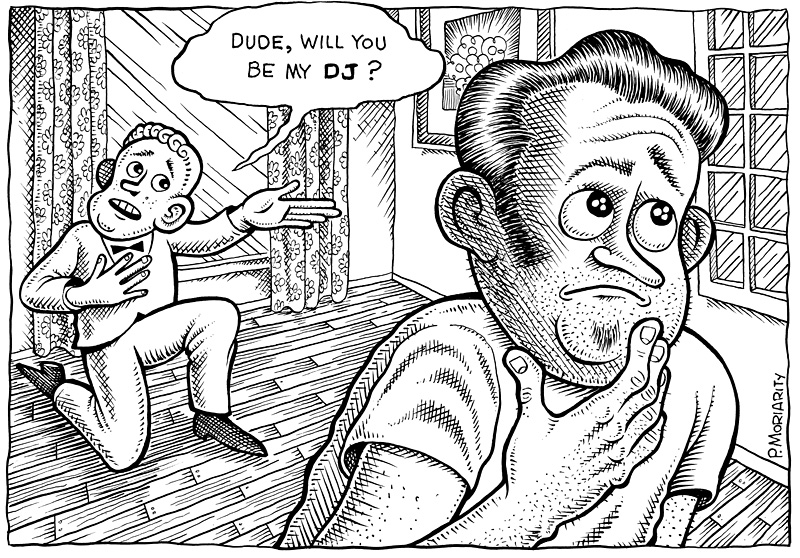Helming music at a wedding is not an easy gig for even the most experienced DJs, and is particularly challenging for a novice. It takes a special set of psychological skills, a cache of songs that extend far beyond one’s personal preferences, and, perhaps most important, that combination of creativity and tolerance that dealing with prickly guests mandates. Before you say yes to providing the soundtrack for your best friend’s wedding, there’s a lot to consider.
Preparation is the best defense. Pre-production is critical, especially knowing the demographics of the guests. Kurt B. Reighley, aka KEXP’s DJ El Toro, has been manning decks professionally since 1996, and has done about 40 weddings since 2004.
“I learned early on to have a meeting with the bride and groom well before the wedding, and ask lots of questions about their event,” he says. “How many guests are coming, what the median age is, whether or not they expect a lot of children, how they feel about profanity in Top-40 songs, and so on.”
He also stresses the importance of asking about least favorite songs as well as favorites. “You don’t want to play the tune that reminds them of that month their best friend was near death with pneumonia,” he explains. “You have no idea how awkward it is to tell the mother of the bride that her precious daughter specifically asked you not to play “Dancing Queen” under any circumstances.”
One good way to insure that tunes the couple loves get into the mix is simply to have them provide a list ahead of time. “I tell them what sort of stuff I like to play, and then I ask them what they like to hear, if there’s a genre or a theme,” says Taj Franke, aka DJ Taco Supreme. “I usually recommend that they burn me a CD or make a playlist on an iPod, and I’ll weave that into what I’m doing so that they’re always catching hits that they know.”
Get ready for Grandma and the Volume Police. “I was doing this Russian wedding on a boat on Eastlake—it was beautiful. But this older woman was just staring at me from across the room while everyone was dancing,” says Franke. “She looked pretty tough, like she worked in the salt mines when she was a teenager or something. She was not impressed…She walked over and put her knuckles down on my DJ table. It was really loud and she didn’t speak very good English, and she started saying, ‘More loud less!’ And I’m trying to figure out if she’s saying ‘More loudness!’ Then she started pawing at my DJ mixer and turning knobs.”
It turned out that this cantankerous, hands-on critic was the groom’s grandmother. “There were about 30 people dancing to Prince,” continues Franke. “But it was too loud for her, so I slowly pulled Prince down to talking level until someone turned around and said ‘Nana! What are you doing?!’
“The main thing many DJs may forget is that though they might be super-tight pals with the bride and groom, you ain’t playing for them,” asserts Scott Giampino, aka DJ Self-Administered Beatdown (also the talent buyer for the Triple Door), who only accepts gigs if he’s friends with the bride or groom. “You are playing for all the other folks there: the uncles, the neighbors, the creepy brother-in-law that drunkenly demands that you ‘do your job’ and play his request of Bon Jovi’s ‘Dead or Alive.’ AND RIGHT NOW.”
Have a sonic escape route. A stockpile of songs that are both crowd-pleasers and personally tolerable is also essential. “I have a mental short list of songs I know will always get bodies moving and that don’t make me want to poke my eyes out with the discarded chicken skewers,” quips Reighley, citing the Jackson 5’s “I Want You Back” and the B-52’s “Love Shack.”
He also has playlists on his computer, labeled “Get Out of Jail Free,” that are nothing but surefire tunes by Elvis, Beyoncé, ’80s faves—the disco classics that aren’t played out. “Alas, the Village People seem to have finally passed their sell-by date,” he notes.
Embrace the unexpected (and the booze). It’s certainly not all Jedi mind tricks and nightmare scenarios, however. Ultimately, holding down the wheels of steel in a matrimonial context is a job for people who can see the gig for what it is and what it should be: a really great dance party.
“Whenever it gets to the end of the night…the lights are turned down and all the sober and old people have gone home, and everyone that’s left is just waiting to dance—that’s when it really kicks up a notch and everything’s really fun,” affirms Franke. “To be a wedding DJ, you really have to like people and be patient with people that you’ll probably never see again. You have to check your ego at the door and remember that you’re there to facilitate a party. It almost never goes according to plan and something will go wrong, but your ability to roll with that without getting angry or frustrated or dramatic really is what people remember.”
“The horror stories really all start to run together after you’ve done enough weddings,” adds Reighley. “One abusive drunk bridesmaid or groomsman isn’t that different from another. And when they’re gone, ask that nice server to slip you a glass of champagne.”








